Sport Science or PE Personal Statement Example
Sports and physical activities generally are a major part of my life, and experience of various types of sport-based work has helped me to realise that this is the field where I should like to make my career. I enjoy both the practical and the theoretical aspects of the subject and believe that I have something of a natural talent for coaching and for devising new activities which will stimulate other people’s interest in sport and their belief in its importance for human well-being, health and stability. At the same time I am very aware of the commercial value of sport as one of the most popular leisure activities globally, and understand well how this requires careful management, planning and directing. The Olympics are a great opportunity for Britain, but it is important that the impetus of 2012 should be maintained after the games are over, and there are major questions about how much the wider population will benefit from the events, what use the facilities will have after 2012 and how sports providers will deal with the inevitable rise in interest in various sports. Marketing of sport is another interesting issue, as are the regional provision of facilities and the ways publicity can help individual and national sporting success. Funding, in my mind, is perhaps the most complex issue of all. It was clear to me, for example, how the UK cyclists achieved such success in the last Olympic Games through a more carefully considered funding policy which allowed for top level training and preparation. Another aspect that interests me is the relationship between “lite” sports and people’s own experience of sporting activity. Are the financial rewards for top sportsmen compatible with the need to get everybody moving and exercising? Is children’s sport of less “value” than the top sporting events we see on television? Should sport be seen as an essential part of the health service? All of these questions have played their part in my own decision to spend my working life in sports development and coaching
I have taken a BTEC level 3 Extended Diploma in Sports Performance, Coaching and Fitness, which has hugely increased my interest in the subject and made me realise how complex and wide-ranging it is. Coaching particularly interests me because I enjoy meeting new people and working with them, finding ways to explain things to them and helping them realise their own potential. My aim ultimately is to work as a coach and to teach others about sports studies, probably as a PE teacher. A degree course would equip me with valuable information about the psychology of coaching and techniques of teaching. I have undertaken work experience in construction, which gave me good training in administrative processes as well as convincing me that I wanted to work in an industry which is practical and physical. It also trained me in the importance of teamwork and cooperation – key qualities in the sports industry. One of my major strengths is my ability to work alongside others in a team, although I am equally happy working individually and using my own initiative. I have also worked for my parents in our family business, which has given me experience of responding to customers and dealing with money.
I appreciate all sports, but my particular favourites are football and skiing, as well as exercising at the gym. I am always keen to keep as fit as possible, believing strongly in the contribution physical fitness makes to health and to mental well-being. I also enjoy music. I am hard-working and conscientious and a disciplined learner, always paying close attention to instructions and performing allotted tasks as well as I possibly can. My attitude to everything I do is positive, I am reliable and believe that I would be an asset in any team. My colleagues find me adaptable and friendly and I get on well with most people, which is one of the reasons I find coaching so congenial. I have total commitment to my goal to become a professional coach and I believe that I have the qualities to make a complete success of the degree course.

Applying to uni

- Find a Course
- Personal statements
Not going to Uni

- Find an Apprenticeship
Careers and Jobs

- Work Experience
- Work Placements
- Apprenticeships
ADVERTISEMENTS

Physical Education Personal Statement Examples
- 1 Personal Statement Example Links
- 2 Career Opportunities
- 3 UK Admission Requirements
- 4 UK Earnings Potential For PE
- 5 Similar Courses in UK
- 6 UK Curriculum
- 7 Alumni Network
Personal Statement Example Links
- Personal Statement Example 1
- Personal Statement Example 2
- Personal Statement Example 3
Passionate about sport and keen on promoting health and fitness? Inspired to cultivate these values within the next generation?
With a course in Physical Education, you could lead the charge in shaping active, healthy lifestyles.
Physical Education (PE) degrees offer an exciting opportunity to delve into the scientific, psychological, and sociological aspects of sports and physical activities. This degree is designed for those who have a passion for sports, fitness, and health, and wish to inspire others to engage in physical activities. It is a multidisciplinary field that combines knowledge from areas such as physiology, psychology, sociology, and pedagogy, to understand the role of physical activity in the health and wellbeing of individuals and communities.
In the UK, a PE degree typically takes three years of full-time study for a Bachelor’s degree (BSc or BA), and one or two years for a Master’s degree (MSc or MA). The curriculum usually includes modules on sports science, coaching and leadership, physical activity and health, sports psychology, and sports sociology. Many programmes also offer work placements, providing students with practical experience in schools, sports clubs, or health organisations.
In addition, a PE degree can also serve as a stepping stone to further study and professional qualifications in areas such as physiotherapy, sports psychology, or sports nutrition.
Overall, pursuing this degree offers a comprehensive understanding of the importance of physical activity, equipping students with the knowledge and skills to promote physical health and wellbeing in a variety of settings. Whether you’re passionate about teaching, coaching, health promotion, or research, a PE degree can open the door to a fulfilling career in the sports and health sectors.
👍 When writing a personal statement : Highlight your passion for the course, demonstrating your understanding of it. Use relevant personal experiences, coursework, or work history to showcase how these have fostered your interest and readiness for the course.
Career Opportunities
A degree in physical education can open up a variety of career opportunities. Physical education professionals can work in a variety of settings, including schools, fitness centers, and sports organisations.
1. Physical Education Teacher: Physical education teachers are responsible for designing and delivering physical education programs in schools. They plan activities, provide instruction, and assess student progress.
2. Athletic Trainer: Athletic trainers work with athletes to prevent and treat injuries. They provide first aid, assess injuries, and develop rehabilitation plans.
3. Fitness Instructor: Fitness instructors lead group exercise classes and provide one-on-one instruction. They create exercise plans, demonstrate proper form, and motivate participants.
4. Sports Coach: Sports coaches provide instruction and guidance to athletes. They develop strategies, assess performance, and motivate athletes to reach their full potential.
5. Recreation Coordinator: Recreation coordinators plan and organise recreational activities. They develop programs, coordinate events, and supervise staff.
6. Sports Administrator: Sports administrators manage sports organisations. They develop budgets, oversee operations, and coordinate events.
7. Sports Psychologist: Sports psychologists work with athletes to improve their mental and emotional wellbeing. They provide counseling, develop strategies, and help athletes manage stress.
8. Sports Nutritionist: Sports nutritionists work with athletes to improve their dietary habits. They provide advice on nutrition, create meal plans, and develop nutrition programs.
UK Admission Requirements
In order to be accepted into a university course in physical education, applicants must have achieved a minimum of Grade C in GCSE Physical Education. In addition, applicants must have achieved a minimum of Grade C in GCSE English Language or Literature and a minimum of Grade C in GCSE Mathematics.
These entry criteria are similar to those for other university courses, however, physical education courses may also require applicants to have achieved a minimum of Grade C in GCSE Science. This is to ensure that applicants have the necessary scientific knowledge to understand the physical education course content.
Applicants may also need to demonstrate a commitment to physical activity and sport, either through participation in a sport or through volunteering in a sporting environment. This is to ensure that applicants have a good understanding of the practical elements of physical education.
Finally, applicants may need to pass an interview or a written assessment in order to be accepted into the course. This is to ensure that applicants are passionate about physical education and have the necessary skills to succeed on the course.
UK Earnings Potential For PE
The average earnings for someone with a degree in physical education will depend on the level of the degree, the type of job they pursue, and the location of their job. Generally, physical education teachers earn an average salary of £24,000 to £32,000 per year. Those with more experience or higher qualifications can earn up to £50,000 per year.
In terms of trends in the job market, there is a growing demand for physical education teachers in the UK, with the number of job openings increasing by 6% in 2020. This is due to the increasing focus on health and fitness, as well as the need for more physical education teachers in schools. Additionally, there is a growing demand for physical education professionals in the corporate sector, as more companies are looking to provide employees with health and fitness options.
Similar Courses in UK
Other university courses related to Physical Education are Sports Science, Exercise Science, and Sports Coaching.
Sports Science is a multidisciplinary field that looks at the science behind sport and physical activity. It focuses on the physical, psychological, and social aspects of sport and exercise, and how they can be applied to improve performance.
Exercise Science is a field that focuses on the physiological and biomechanical aspects of physical activity. It looks at how the body responds to exercise, and how to design exercise programs that are tailored to an individual’s needs.
Sports Coaching is a field that focuses on the teaching and development of sport skills. It looks at how to motivate and engage athletes, and how to create a successful team environment.
The key differences between these courses and Physical Education are that Physical Education focuses on the overall development of physical and mental health, while the other courses focus on specific aspects of sport and exercise.
Physical Education looks at the development of the whole person, while the other courses focus on specific aspects of sport and exercise. Physical Education also looks at how to teach physical activities, while the other courses focus on the scientific and coaching aspects of sport and exercise.
UK Curriculum
The key topics and modules covered in a physical education course in the UK curriculum typically include:
- Anatomy and Physiology: This module covers the structure and function of the human body, including the skeletal, muscular, and cardiovascular systems.
- Exercise Physiology: This module looks at the body’s response to physical activity and exercise, as well as the effects of exercise on health and performance.
- Sports Science: This module covers the scientific principles underpinning physical activity and exercise, including biomechanics, nutrition, and psychology.
- Sports Psychology: This module explores the psychological aspects of sports performance, such as motivation, goal setting, and mental toughness.
- Sports Coaching: This module looks at the principles of effective coaching and how to develop and implement successful training programmes.
- Sports Injury and Rehabilitation: This module covers the prevention and management of sports injuries, as well as rehabilitation techniques.
- Outdoor Adventure Activities: This module looks at the principles of outdoor adventure activities, such as rock climbing, mountain biking, and kayaking.
- Physical Activity Leadership: This module covers the principles of leading physical activity sessions, such as planning, risk assessment, and delivering effective instruction.
Hands-on experience and practical work is an important part of physical education courses. Students typically participate in physical activities and sports, as well as practical sessions such as anatomy and physiology labs.
Alumni Network
Notable alumni from the course of physical education include Olympic gold medalist Jackie Joyner-Kersee and professional basketball player Michael Jordan. Joyner-Kersee is a six-time Olympic medalist who has set world records in track and field events.
She has also founded the Jackie Joyner-Kersee Foundation, which helps to provide educational and athletic opportunities to youth in her hometown of East St. Louis, Illinois. Jordan is a six-time NBA champion and one of the most recognizable basketball players in the world. He is also the owner of the Charlotte Hornets and a major contributor to numerous charities.
Alumni events and networking opportunities available for physical education alumni include the annual Physical Education Alumni Reunion held at the university, which provides alumni with the chance to reconnect with former classmates and faculty, as well as to learn about the latest developments in the field.
Additionally, alumni can join the Physical Education Alumni Network, which offers a variety of resources for alumni to stay connected and engaged with the university and the physical education community.
Reach out to us for career and sponsorship opportunities
© 2024 Acrosophy Excellence in Application
A Medical MBA Company The Medical MBA Ltd Company number: 13561401 86-90 Paul Street, London, England, United Kingdom, EC2A 4NE
- International
- Schools directory
- Back issues
- New Teachers
- Resources Jobs Schools directory News Search
How to write the perfect teaching personal statement
Application and interview, tes editorial.

When applying for a new job, you may be competing with tens or hundreds of other applicants in a race for the role.
The HR manager or headteacher recruiting for the job will be scrutinising every detail of your application to make sure they are bringing in the right people for interview.
The application form is the first hurdle you have to get over and sets the first impression of you as a person in the recruiter’s mind.
- Advice on honing your job search
- How to write a personal statement for teacher training
- How to write a must-read CV
The personal statement: why does it matter?
The personal statement presents the perfect opportunity to show you are an exceptional candidate, understand teaching and know the school you are applying to.
It is not an easy task and is a tricky thing to get right. It requires being concise and clear – it shouldn’t be too long or read like a list.
You should talk about yourself and your professional achievements, while at the same time apply those experiences to the school itself.
We spoke to Malcolm Trobe, deputy general secretary of the Association of School and College Leaders , about what goes into the perfect personal statement. Here's what he said:
What does a great teaching personal statement look like?
"In general, I would say no longer than two sides of A4 – typescript. It needs to be well structured and linked to the specific school. It will need to include a number of key areas, including behavioural management, educational philosophy, subject expertise, pedagogy, personal organisation and skills and enrichment activities that the candidate can bring."
What should it contain?
"I would recommend that candidates include three elements in each of the key areas:
- What their beliefs/philosophy/approach is – i.e., the theory
- Their experience in that area
- How they would use that experience in the school they are applying to and specific to the job they are applying for
The statement should also include something personal in terms of their outside interests to indicate that they live an interesting and well-balanced life."
What are school leaders looking to read in a good personal statement?
"They will want to see something of the person’s character come through. It must not be just a list of achievements or repeat of the CV. It needs to be well-written, error-free and mention the school they are applying for – but not too many times. It should read as if it has been specifically written for the school and job they are applying for. I would be looking for something similar to the approach I have indicated above, covering all of the key areas and indicating that they have a vocation for working with young people. Somehow I would like to see a ‘generosity of spirit’ come through in the statement."
How can a candidate stand out in a personal statement?
"A good personal statement needs to include something of the person themselves. It has to make the reader believe that the candidate has something special without bragging or appearing arrogant – but something a bit above what other candidates may offer. A really good introduction and ending are important, and it's worth spending a great deal of time crafting those sections of the statement. Hook the reader in at the beginning and finish on a high note so that they want to meet the person and explore what has been written."
Want to keep up with the latest career advice? Follow Tes Jobs on Twitter and like Tes Jobs on Facebook
Clearing Universities & Courses
Clearing advice.
Recommended Clearing Universities
Popular Course Categories
Course search & discover.
Start the search for your uni. Filter from hundreds of universities based on your preferences.
Search by Type
Search by region.
Recommended Universities

University Academy 92, UA92
North West England · 100% Recommended

University of Portsmouth
South East England · 98% Recommended

City, University of London
London (Greater) · 93% Recommended
Search Open Days
What's new at Uni Compare

West London Institute of Technology
WLIoT provides students with higher technical skills that are demanded by employers, learn more here!

ARU Writtle
Ranked #1 in the East of England for Student Satisfaction, click here to learn more!
Ranking Categories
Regional rankings.
More Rankings
Top 100 Universities
Taken from 65,000+ data points from students attending university to help future generations
About our Rankings
Discover university rankings devised from data collected from current students.
Guide Categories
Advice categories, recommended articles, popular statement examples, statement advice.

What to include in a Personal Statement

Personal Statement Tips
Personal statement examples physical education personal statements.
Discover personal statement examples written by students accepted onto physical education and related courses. Read through the examples to help shape your own personal statement.
Physical Education Personal Statements
Submitted by Ellie
Physical Education Personal Statement
An active lifestyle has fuelled my passion for Physical Education (PE...
Physical Education Personal Statement Advice
Your personal statement is the pièce de résistance of your university application. All university students need to write one and they all need to be good enough to show a university why you should be allowed to study with them. In reality, your Physical Education personal statement is your one chance to show your passion for the subject as this, above all else, is what sells you to a university. While your extracurricular activities and work experiences will help to paint the picture of who you are, your passion for the subject is often the defining aspect of your Physical Education personal statement. Before you start writing your Physical Education personal statement, then we recommend taking a look at some Physical Education personal statement examples beforehand. These statements give you the chance to see how to structure your statement, what you should include and the general structure of your Physical Education personal statement. Don’t worry, your Physical Education personal statement doesn’t need to be Remembrance of Things Past, you will only have 4,000 characters and it's very easy to meet this character count. Make sure you're clear and concise and you will be okay. If you still find yourself struggling with your Physical Education personal statement, then we recommend inducing the following three points in your statement:c Talk about your love and passion for Physical Education. Any relevant work experience in the world of Physical Education. Any achievements, academic or otherwise.
Want to learn more about a university?
Get your questions answered by sending them an enquiry now.
undergraduate Universities
Undergraduate uni's.

Uni of Portsmouth
370 courses

246 courses

Ravensbourne
.jpg)
103 courses

West London IoT

Uni of Kent
429 courses

Uni of Roehampton
270 courses

Goldsmiths, UOL
272 courses

Uni of Sunderland
200 courses

Uni of Surrey
437 courses

Uni of East London
299 courses

Middlesex Uni
313 courses

Uni of Chester
402 courses

Cardiff Met Uni
304 courses

Northeastern Uni

Uni of Winchester
166 courses

Uni of Hertfordshire
418 courses

Uni of Suffolk
106 courses

238 courses

528 courses

Uni of Bradford
197 courses

Uni of Bedfordshire
343 courses

Uni for Creative Arts
323 courses

Coventry Uni
446 courses

Uni of Reading
393 courses

Leeds Beckett Uni
325 courses

Staffordshire Uni
276 courses

Heriot-Watt Uni
207 courses

Kingston Uni
386 courses

415 courses

Uni of Leicester
267 courses

Anglia Ruskin Uni
463 courses

Swansea Uni
782 courses

Uni of Westminster
331 courses

Leeds Arts University

Uni of Essex
802 courses
,-Bristol.jpg)
UWE, Bristol
250 courses

Wrexham Uni
168 courses

Uni of C.Lancashire
440 courses

Escape Studios

365 courses

Uni of Huddersfield
453 courses

Uni of Brighton
252 courses

Bath Spa Uni
295 courses

Edge Hill Uni
245 courses

Uni of Hull
273 courses

Manchester Met Uni
316 courses

Nottingham Trent
531 courses

Edinburgh Napier
184 courses

Queen's Uni
410 courses
Find the latest from Uni Compare


University of Huddersfield
Awarded Gold in the TEF Rankings 2023, click here to learn more!

University of Hertfordshire
Hertfordshire has the highest growth of all East of England university graduate start-ups over the last five years!
Dark background
Light background
Text only mode
How to get into teaching
How to write your teacher training personal statement
Your teacher training personal statement should express why you'd make a great teacher and spell out your experiences, qualities and skills. We've got the inside track from Admissions Tutors on how to go about writing a good teacher training personal statement, what to do and what not to overlook...
6 minute read
Share to: Facebook , LinkedIn , Twitter
Let's start with a look at when to apply for teacher training. Places on teacher training courses are filled on a first come first serve basis. This is due to two factors. Firstly, the Department for Education set the maximum number of trainees on some courses. But the thing that really limits the number of places available is ensuring that there are enough school placements for all trainees. Training providers can only recruit up to a number that is manageable in terms of providing the trainees with the placement experiences they need.

Places for the most popular subjects tend to go early, for example, Physical Education (PE), Primary and Psychology. Shortage subjects such as Chemistry, Computing, Maths and Physics don’t fill up so fast.
The route you are taking into teaching may also influence when you apply. School Direct is run by the schools themselves and they can only take as many trainees as they can train within their schools. They may only have the one place available for your chosen subject and once those placements are gone, they’re gone. Universities tend to have larger and wider networks of partner schools which provide school placements. This gives them more options for finding school placements so they may have places available for longer. Unlike School Direct you don’t get to choose exactly which school you go to, though they’ll try to match your school placements to your preferences as much as possible. If you apply late you run the risk that all the placements are gone.
So, you want to apply as soon as you can, with a brilliant personal statement that reflects who you are and why you want to become a teacher. So, what does that look like?
Your teacher training personal statement broadly needs to convey four things:
- Your passion for wanting to become a teacher and commitment to the profession.
- Your reasons for wanting to teach your chosen subject.
- The skills and experience that you’ll bring to the role of teacher.
- Your awareness of the realities of what lies ahead - it’s a challenging but rewarding role so you need to be realistic about this and be aware of some of the hot topics facing the sector.
Kate Brimacombe, Associate Professor of Education and Associate Director of the Teacher Education Partnership at Plymouth Marjon University, explains what she is looking for in a teacher training personal statement:
“It's really lovely to get something that's individual and firstly I want to see that passion for wanting to work with children. You absolutely can get that across - it comes off the page.
“It can’t feel half-hearted, it needs to feel committed. If independence, motivation, and self-reliance don’t sing off the page, then that's an error in a sense. You need to get your personality into the written word, I’m looking for that fire that says ‘this is absolutely what I want to do’. One common mistake is being too short so that it doesn’t get that passion across. The lack of content and desire are the main reasons I don't shortlist candidates.”
You must convey why you want to teach your subject. What is your expertise? Why do you love it? What are the challenges facing teachers of your subject? Why do you want to teach this? Think about the age group you’ll be teaching and discuss why you want to teach them. What relevant experience do you have? How does your experience to date influence your thinking?
Ultimately, you’ve got to inspire others to love your subject, so be clear about how your own relationship to it is going to enable this.
The ingredients of a convincing teacher training personal statement are:
- Passion for teaching. Express your drive and fire on the page.
- Be individual. Stand out in a positive light; one tip here is not to waste characters on quotes, they don’t say anything about you.
- Convey your desire to work with children. Explain where this comes from.
- Prove it. Include the things you have actively done, what you’ve learnt from real life experiences in schools and/or working with children, and what you got out of it.
- Demonstrate the qualities of a teacher. Point out your commitment, empathy, independence, innovation, motivation, patience, self-reliance, and tip-top organisation skills.
- Depth. Don’t cut it too short, you’re allowed up to 4000 characters which is around 600-700 words, so write until you’re thereabouts, and then edit it so that it reads even better.
In addition, for a strong personal statement you’ll want to demonstrate some awareness of the national curriculum for your subject and then highlight how your subject knowledge maps to it.
Back to Kate for another crucial tip: “The other big thing is that we’re checking the accuracy of your spelling and grammar, it must be correct if you’re going to be a teacher. To be fair, we don't get a lot of mistakes because I think people understand that expectations around written and verbal communication are high in teaching.”
Some aspiring teachers know they want to teach but are uncertain on the age group or subject. For example, maybe you love sport and are keen to be a secondary PE teacher, but you also enjoy working with younger children at sports clubs so you’re feeling split. In this scenario, try to settle this before you apply but if you can’t then write honestly about the situation and take extra care to ensure that neither option comes across being the fallback one that you’re not really committed to.
The magic ingredient: Examples from your own experience
There's no one way to structure your teacher training personal statement but be sure to back up every point you make with evidence. A great way to do this is give real life examples of what you actually did, and what you learned from it. It’s not enough to just list your work experience, you need to explain what you learned and how this experience will help you as a teacher.
You don’t need school experience to apply for a teaching course, though it helps. But if you don’t have school experience then you at least need some transferable skills, so any other experience of working with children is valid here, things like helping with sports teams and youth clubs are valid too. Use your examples to demonstrate the skills you’d bring to the role of teacher.
You could also refer to a teacher who made a difference to you at school, or who influenced your love of working with children and helping them to learn.
By discussing examples, you can also demonstrate that you are realistic about the role, in that is challenging as well as rewarding. For example, you might discuss a session you observed or taught, reflecting on what went well, how you adapted to the situation and how you would improve on it.
This is how to make effective use of real life examples, according to Julie Stevens, course leader for PGCE Secondary Education at Plymouth Marjon University: “I want to read about how you’ve helped a pupil to make progress. What did you change? How did you recognise they weren’t learning? What did you adapt to help them understand? Maybe you modelled it or talked it through? How did the child respond? You might talk for example about why a child was messing around or why a seating chart was put together in a certain way. It’s really encouraging when a candidate offers insights into teaching and that sense of self-reflection”.
You can talk about that examples that demonstrate transferable skills. For example, maybe you had to be resilient to get your Duke of Edinburgh award, maybe you’re a leader on the sports field or maybe you’re a dedicated musician with the music exams to prove it?
In addition, the way you talk about children is really important, the training provider needs to know that you see them as individuals and that you want to help them become independent thinkers. Back to Julie again for more about this: “I want to see candidates who talk about children as individuals and how you can help them make the best progress they can. Helping young people to make decisions for themselves and become independent learners, so that they take responsibility for their own success is essential for adulthood.
"It’s great when someone can talk about innovative things, like how to use social media for good outcomes. Anything like that is powerful because it means they understand our role as educators – we aren’t just filling them with knowledge, we're trying to get children and young people to understand how to develop themselves.”
Get your referee geared up
References really do matter. Julie and Kate report that in practice most of barriers to shortlisting a candidate come not from the personal statement, but from references that are too short. They’ve seen references as short as three lines and that doesn’t tell them enough about you and your suitability for a career in teaching. You could be an impressive candidate, but you can’t be offered a place until your reference checks out.
If you’re applying for undergraduate teacher training through UCAS then one reference is required. If you’re applying for postgraduate teacher training then you’ll need two references. If you’re at university, or have been within the past five years, then one reference must be from someone at your university. The other reference can be from someone who knows you from work, and if you’re applying for School Direct then one of your references must come from your current employer.
A good reference says good things about you and backs up some of qualities and skills you’ve outlined in your personal statement. Your referee needs to talk about your character and why they think you could be a great teacher. The training provider is looking for insight; a different perspective on you, and hopefully one that that verifies the impressions they’re taking from your statement.
You can do a lot to make sure your reference is on point. First ask your referees if they are willing to be your referee and if they think you’ve got the potential to be a good teacher. Next you need to arm them with all the arguments as to why you’ll be a good teacher, they probably don’t know everything you do. Ideally they would read your personal statement so that they can write a reference that complements it.
If applicable, ask your referee to comment on your academic abilities, including your predicted grades. If possible, go through the reference with your referee as you might see something they’ve missed. If so, ask if they are willing to add it, it’s up to them but you can suggest things.
A good teacher training personal statement shows passion and love for teaching, as well as that you’ve done some research and that you’re dedicated to teaching career. Show your personality; show them the teacher you could be. @marjonuni
Back to Kate for closing advice: “Speak with honesty and speak from the heart. I’m looking for passion. I'm looking for somebody I think the has the potential. Then when you come to interview, I already know that you have that passion and so you just need to add the shine to that and tell us more about it in-person, one to one. In that way your teacher training personal statement is the stepping stone into the interview, if it does its job then we’ll be excited to find out more about you”.
You’ve got this. Follow the advice above and you’ll have a brilliant teacher training personal statement in the bag. The next step will be your teacher training interview, so why not check out our articles on how to ace your teacher training interview and teacher training interview questions .
Share this page on
beta This is a new service - your feedback will help us to improve it.
- Jobseeker guides
How to write a teacher personal statement
What experience do you have, are you engaged in teaching theory and research, are you up to date on safeguarding statutory guidance, what are your skills and qualities, how can you contribute to wider school life, search for roles.
Your personal statement is your first opportunity to show the school you’re a great fit for the job, and gets you closer to being shortlisted for an interview. The more you show how your skills and interests match the school’s ethos and values, the better. We’ve spoken to a range of teachers to get their top tips for success.
Schools want to hear about your trainee experience with different subjects, key stages, types of school, and working with a range of pupils.
Think about your approach to teaching, how you keep pupils engaged, and how you communicate with different kinds of people (children, staff, parents and carers). Ensure you provide evidence for how you have improved student engagement and built positive relationships with pupils.
Schools will be interested in your approach to behaviour management, so think about your go-to strategies.
Think about any research that has affected your teaching practice. Explain what has worked well and if it didn’t, what you learnt.
You need to demonstrate your awareness of the importance of safeguarding and the requirements of Keeping Children Safe in Education . Include any examples of how you worked with a Designated Safeguarding Lead.
Are you a well-organised, confident, and motivated teacher? Say it, and provide examples! Schools are looking for great communicators, team players and relationship builders. Make sure you say how you create a positive learning environment, and consider skills like time management, organisation, and flexibility. Schools will also want to know how you overcome challenges.
Set yourself apart by showing how your hobbies and achievements could contribute to the wider school community. Could you run an after school club or organise school trips?
Search for roles on Teaching Vacancies now.
Cookies on Teaching Vacancies
We’d like to set additional cookies to understand how you use this service and help us improve it. We also use cookies set by other sites to help us deliver content from their services.
Writing a Postgraduate Teacher Education personal statement
Updated on 7 July 2023
Guidance on how to write a PGDE/CE personal statement and an example to help demonstrate your skills, experience and motivation for teaching.
A personal statement is a short piece of writing (47 lines/4000 characters) which you are asked to submit in support of your application to study a PGDE/CE made through UCAS. It is your opportunity to demonstrate your skills, experience and motivation for teaching.
Before you start
Remember that this is a very important part of your application. Take your time to carefully plan out and practise your statement. It is a good idea to draft your statement in a word document and get some feedback on it before committing to the final version..
- Don't waste space with irrelevant or repetitive information. Be succinct and avoid complicated language and overly long sentences.
- Be specific about what you have to offer. Detail what you have gained from your experiences in schools/working with children. Give appropriate evidence of the skills you possess for teaching.
- Indicate the relevance of other types of experience or skills you possess, e.g. supervising people or sports
- Avoid using negative language. Present any gaps in skills or experience positively.
- Finish with a summary of what you have to offer leave the selectors with a clear understanding of your suitability for the course.
- Let your enthusiasm for teaching and working with children shine through in everything you say.
- Check grammar and spelling thoroughly! Do not rely on the spelling and grammar check on your word processing package alone. Ask someone to proof read it for you.
- If you are cutting and pasting from a word document, remember to check the formatting.
Questions to consider when structuring your Personal Statement
- Why do you want to be a teacher? - What has inspired you; who/what influenced you?
- Why do you want to work with young people? - What appeals to you about working with this age group; what skills do you possess that will help you?
- Why do you want to teach your subject? For primary: demonstrate a breadth of knowledge across a range of curriculum areas. For secondary, show how your subject knowledge is relevant to the curriculum.
- What have you gained from working with young people? - Have you had any experience in schools or working with children in other settings? Reflect upon what you did, what you observed, what you learned.
- What else can you offer? Skills in sports, music, languages, arts and crafts, ICT etc.
This is an example personal statement. There is considerable room for improvement and the notes make suggestions to help you with writing yours.
I am applying for the PGDE course because I have always wanted to be a teacher. I really like working with children and think that I have the right kinds of skills to become a good teacher .
- The above statement is far too short: you are allowed 47 lines/4000 characters so use them.
- Remember to specify whether you are applying f or primary or secondary courses.
- It is not enough to say that you have developed the "right kinds of skills". Be specific about them.
- It is important to have a strong opening statement . It is the first thing the selectors will read so you want to make an impact.
- Think about why you have always wanted to teach and clearly demonstrate.
New Paragraph
At school, I was involved with the Primary 1 class when I was in final year. I helped the less able children with reading on a one to one basis. I also help out at my local Brownie pack every week, keeping the girls busy with various activities. I have applied to do the Student Tutoring Scheme.
- When describing experience with children, make sure you are specific about what you learned from the work and the skills you developed.
- You need to demonstrate (by providing evidence) that you have developed/ have the potential to develop skills such as communication, leadership, teamwork, problem solving, organisation, planning and time management.
At school I studied a wide range of subjects but the one I enjoyed most was History so that is what I have studied at university. I also took Psychology and Politics in first year and Politics in second year too.
- When describing your studies, remember to show how this is relevant to the subject(s) you will be teaching.
I have been a babysitter for two children for several years and enjoy helping the older child with his homework now that he is at school.
- When describing your experience remember to demonstrate the transferable skills you have gained in this role that would be relevant to teaching. For example with babysitting you could link to the skill of 'behaviour management'.
I am very interested in education generally and keep up to date with current issues by reading the BBC website.
It is not enough to say that you 'keep up-to-date' here. Give a summary of what you have to offer and stating why you should be offered a place on the course.
Careers service
Suggestions in Courses
Suggestions in news.
- No suggestions found.
Suggestions in Events
Writing a pgce personal statement.
If you’re applying to train as a teacher you’ll be required to write a personal statement as part of your application.
Take your time writing your personal statement. It’s your first chance to make a good impression so it's well worth investing time to develop a clear structure and style of writing.
It’s a good idea to proofread your statement thoroughly and get others to read through and check for typos, grammatical errors, style, and tone.
What's the personal statement for?
The personal statement is crucial to your PGCE application; it is used primarily to decide whether to invite you for an interview. A poorly written personal statement could end your teaching career before it has started!
This is your chance to demonstrate what you have to offer as a teacher. You should also explain why you want to teach a particular subject or age range, and how your skills and experience will help you become a great teacher. It’s your chance to show your motivation, commitment and teaching potential and an opportunity to show your enthusiasm for teaching a particular subject or age group.
Remember, you only get one opportunity to write a personal statement for both cycles of applications, so it’s important to keep in mind that you should avoid creating tailored personal statements for each university.
How to write and structure your personal statement
The personal statement is split into two sections totalling a maximum of 1,000 words. It’s important to make sure you do not repeat yourself and to take time to ensure that each section is organised coherently. Divide your writing into paragraphs, each dealing with a particular aspect of the question.
Section 1: Why do you want to teach?
(Up to 600 words).
This is the place to talk about why you think you would make a great teacher. You can include:
- what has led you to choose teacher training
- your understanding of the demands and rewards of the PGCE course and of the teaching profession
- the personal qualities that will make you a valuable asset to a school
- details of any paid or unpaid experience you have of working with young people and what you learnt
- details of any other experiences which you can bring to the teaching profession. Think about any ‘transferable skills’ or qualities which you have developed which may be relevant to teaching.
- If you are a career-changer, what have you been doing and what are your reasons for the switch to teaching?
- your thoughts on children’s wellbeing and the education system
Your personal statement should tell us why you want to teach, your skills and about any experience you might have of working with young people or in the education sector. If you are taking any exams or additional study before starting the course, particularly if this relates to your eligibility to join the course, we want to hear about it.
It should also show that you understand the education system, what challenges teachers face and that you’re engaged with issues around education.
If you’ve not taught before, think about any other things you’ve done that might demonstrate the skills you’ll need to be a teacher (your transferable skills).
Although it’s a good place to expand on your skills and experience, this shouldn’t be the main focus of your personal statement as the rest of the application will showcase this.
Section 2: Why are you suited to teach your subjects or age group?
Up to 400 words.
Remember to not repeat anything you have already said in section 1!
If you’re writing a personal statement for secondary teacher training, use this section to describe your knowledge and experience of the subjects you’ve chosen. Any work experience in the field will be of interest.
What universities are looking for
Universities want to see your passion for teaching and understand why you think teaching this subject or age group is the right career for you.
Your personal statement should be original and honest. Try and avoid clichés or writing what you think we want to hear. All we really want to hear are the real reasons you’re applying to study a PGCE and become a teacher.
If you’re writing a personal statement for primary teacher training, say why you’d like to teach this age group. If you are particularly interested in certain primary subjects or have relevant experience in them, you can talk about that here too.
You could talk about:
- any relevant work or unpaid experience
- your degree and degree modules
- your other relevant qualifications, such as A levels
- any relevant skills, interests or achievements
- your understanding of the national curriculum
Questions your personal statement should answer
- Why do you want to be a teacher?
- Why do you want to teach a particular subject, Key Stage or age group?
- What are your strengths?
- What experience do you have and how has this influenced your desire to teach?
- What skills do you have that would be useful for teaching
The finer details
Your personal statement should be:
- no more than 1000 words
- written in the first-person
- grammatically correct - we suggest writing in a document before adding to your application
- your own work, don’t copy from anywhere online
- structured correctly with a clear introduction, evidenced paragraphs and a conclusion
- proof-read before being submitted
And finally, be prepared to answer questions about what you’ve written in your personal statement at the interview stage!
Find out more about how to get into teaching .
.jpg)
Find out more about how to get into teaching .
Follow us on social!
Facebook Instagram LinkedIn Twitter YouTube
Study a PGCE at London Met

PGCE Primary (3-7) - PGCE
Study this PGCE Primary course and become a qualified teacher of three to seven-year-olds.

PGCE Primary (5-11) - PGCE
Train to teach five to 11-year-olds on this PGCE course that leads to Qualified Teacher Status (QTS).

PGCE Secondary Computer Science with ICT - PGCE
Train to teach Computer Science with ICT to 11 to 16-year-olds and, by arrangement, 16 to 18-year-olds.
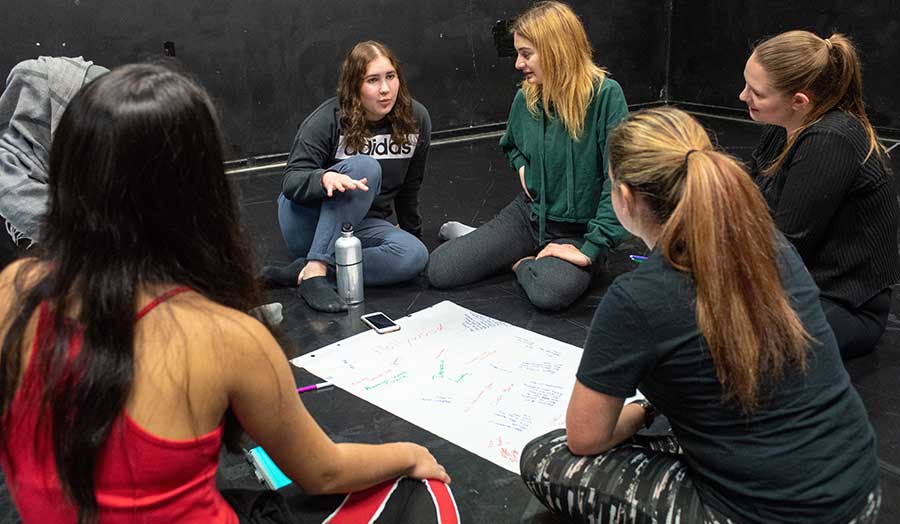
PGCE Secondary English with Drama - PGCE
This course will train you to teach English and Drama to 11 to 16-year-olds and, by arrangement, 16 to 18-year-olds.
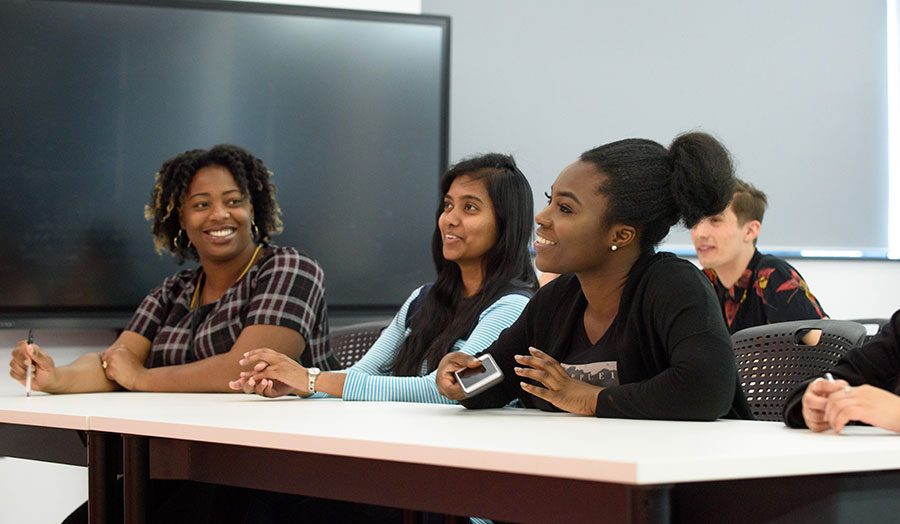
PGCE Secondary English with Media - PGCE
Train to teach English and media to 11 to 16-year-olds and, by arrangement, 16 to 18-year-olds.

PGCE Secondary Mathematics - PGCE
Train to teach maths to 11 to 16-year-olds and, by arrangement, 16 to 18-year-olds. This course leads to Qualified Teacher Status (QTS).

PGCE Secondary Modern Languages - PGCE
Train to teach modern languages to 11 to 16-year-olds and, by arrangement, 16 to 18-year-olds with our PGCE course that leads to Qualified Teacher Status (QTS).

PGCE Secondary Science with Biology - PGCE
Train to teach science and biology to 11 to 16-year-olds and, by arrangement, 16 to 18-year-olds on this PGCE course that leads to Qualified Teacher Status (QTS).
PGCE Secondary Science with Chemistry - PGCE
Train to teach science and chemistry to 11 to 16-year-olds and, by arrangement, 16 to 18-year-olds. This PGCE course leads to Qualified Teacher Status (QTS).

PGCE Secondary Science with Physics - PGCE
Train to teach science and physics to 11 to 16-year-olds and, by arrangement, 16 to 18-year-olds on our PGCE course that leads to Qualified Teacher Status (QTS).
-(1).jpg)
Primary (7-11) (Key Stage 2) - PGCE
Train to teach seven to 11-year-olds on our specialist Key Stage 2 course, with Qualified Teacher Status (QTS).
More articles like this...
Checking your eligibility to study a pgce, how to prepare for your teacher training application, how to write a good personal statement for pgce application, what to expect at your pgce interview.
- Applying to Uni
- Apprenticeships
- Health & Relationships
- Money & Finance
Personal Statements
- Postgraduate
- U.S Universities
University Interviews
- Vocational Qualifications
- Accommodation
- Budgeting, Money & Finance
- Health & Relationships
- Jobs & Careers
- Socialising
Studying Abroad
- Studying & Revision
- Technology
- University & College Admissions
Guide to GCSE Results Day
Finding a job after school or college
Retaking GCSEs
In this section
Choosing GCSE Subjects
Post-GCSE Options
GCSE Work Experience
GCSE Revision Tips
Why take an Apprenticeship?
Applying for an Apprenticeship
Apprenticeships Interviews
Apprenticeship Wage
Engineering Apprenticeships
What is an Apprenticeship?
Choosing an Apprenticeship
Real Life Apprentices
Degree Apprenticeships
Higher Apprenticeships
A Level Results Day 2024
AS Levels 2024
Clearing Guide 2024
Applying to University
SQA Results Day Guide 2024
BTEC Results Day Guide
Vocational Qualifications Guide
Sixth Form or College
International Baccalaureate
Post 18 options
Finding a Job
Should I take a Gap Year?
Travel Planning
Volunteering
Gap Year Guide
Gap Year Blogs
Applying to Oxbridge
Applying to US Universities
Choosing a Degree
Choosing a University or College
Personal Statement Editing and Review Service
Guide to Freshers' Week
Student Guides
Student Cooking
Student Blogs
- Top Rated Personal Statements
Personal Statement Examples
Writing Your Personal Statement
- Postgraduate Personal Statements
- International Student Personal Statements
- Gap Year Personal Statements
Personal Statement Length Checker
Personal Statement Examples By University
Personal Statement Changes 2025
- Personal Statement Template
Job Interviews
Types of Postgraduate Course
Writing a Postgraduate Personal Statement
Postgraduate Funding
Postgraduate Study
Internships
Choosing A College
Ivy League Universities
Common App Essay Examples
Universal College Application Guide
How To Write A College Admissions Essay
College Rankings
Admissions Tests
Fees & Funding
Scholarships
Budgeting For College
Online Degree
Platinum Express Editing and Review Service
Gold Editing and Review Service
Silver Express Editing and Review Service
UCAS Personal Statement Editing and Review Service
Oxbridge Personal Statement Editing and Review Service
Postgraduate Personal Statement Editing and Review Service
You are here
- Mature Student Personal Statements
- Personal Statements By University
- Accountancy and Finance Personal Statements
- Actuarial Science Personal Statements
- American Studies Personal Statements
- Anthropology Personal Statements
- Archaeology Personal Statements
- Architecture Personal Statements
- Art and Design Personal Statements
- Biochemistry Personal Statements
- Bioengineering Personal Statements
- Biology Personal Statements
- Biomedical Science Personal Statements
- Biotechnology Personal Statements
- Business Management Personal Statement Examples
- Business Personal Statements
- Catering and Food Personal Statements
- Chemistry Personal Statements
- Classics Personal Statements
- Computer Science Personal Statements
- Computing and IT Personal Statements
- Criminology Personal Statements
- Dance Personal Statements
- Dentistry Personal Statements
- Design Personal Statements
- Dietetics Personal Statements
- Drama Personal Statements
- Economics Personal Statement Examples
- Education Personal Statements
- Engineering Personal Statement Examples
- English Personal Statements
- Environment Personal Statements
- Environmental Science Personal Statements
- Event Management Personal Statements
- Fashion Personal Statements
- Film Personal Statements
- Finance Personal Statements
- Forensic Science Personal Statements
- Geography Personal Statements
- Geology Personal Statements
- Health Sciences Personal Statements
- History Personal Statements
- History of Art Personal Statements
- Hotel Management Personal Statements
- International Relations Personal Statements
- International Studies Personal Statements
- Islamic Studies Personal Statements
- Japanese Studies Personal Statements
- Journalism Personal Statements
- Land Economy Personal Statements
- Languages Personal Statements
- Law Personal Statement Examples
- Linguistics Personal Statements
- Management Personal Statements
- Marketing Personal Statements
- Mathematics Personal Statements
- Media Personal Statements
- Medicine Personal Statement Examples
- Midwifery Personal Statements
- Music Personal Statements
- Music Technology Personal Statements
- Natural Sciences Personal Statements
- Neuroscience Personal Statements
- Nursing Personal Statements
- Occupational Therapy Personal Statements
- Osteopathy Personal Statements
- Oxbridge Personal Statements
- Pharmacy Personal Statements
- Philosophy Personal Statements
- Photography Personal Statements
- Physics Personal Statements
- Physiology Personal Statements
- Physiotherapy Personal Statements
- Politics Personal Statements
- Psychology Personal Statement Examples
- Radiography Personal Statements
- Religious Studies Personal Statements
- Social Work Personal Statements
- Sociology Personal Statements
- Sports & Leisure Personal Statements
- Sports Science Personal Statements
- Surveying Personal Statements
- Teacher Training Personal Statements
- Theology Personal Statements
- Travel and Tourism Personal Statements
- Urban Planning Personal Statements
- Veterinary Science Personal Statements
- Zoology Personal Statements
- Personal Statement Editing Service
- Personal Statement Writing Guide
- Submit Your Personal Statement
- Personal Statement Questions 2025
- Personal Statement Changes 2024
Teacher Training Personal Statement Examples
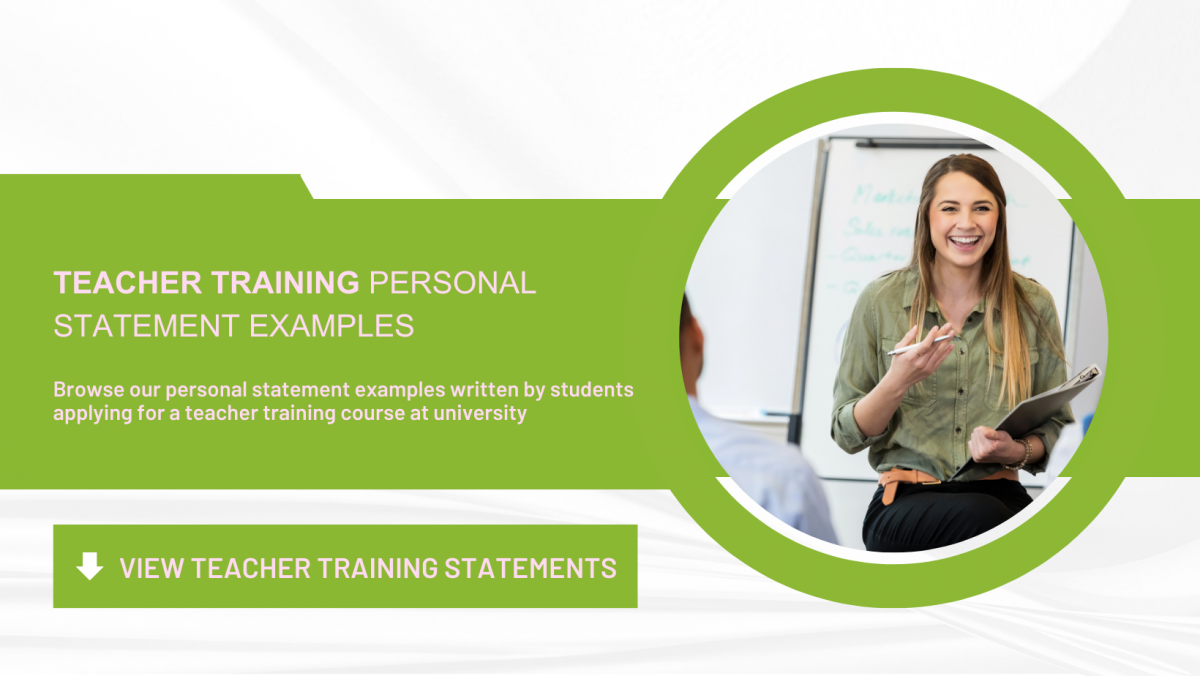
What is a teacher training personal statement?
The teacher training personal statement is your opportunity to let training providers know about your qualities, skills and expertise, and why you want to teach.
While your application form briefly outlines your qualifications, skills and work experience, your teaching personal statement is where your personality shines through.
Take your time with it, be prepared to receive constructive feedback and write a few drafts before you send it off.
How do I write a good teacher training personal statement?
To help you write a successful teacher training personal statement, we recommend you include:
- use examples to back everything up, based on your teaching experience so far
- tailor your personal statement according to the age group you wish to teach
- write using concise English, using first person terms such as 'my' and 'I'
- be original and honest - don't embellish the truth or lie outright
- avoid clichés and general statements, such as 'since a young age' or 'I've always wanted to be a teacher'
- demonstrate your passion and enthusiasm for teaching.
You have up to 4,000 characters to write a memorable opening, middle and conclusion.
Don't waste your valuable space on writing about things that are already on your UCAS form elsewhere, such as your qualifications.
What should I include in my teacher training personal statement?
When planning out your personal statement, ask yourself what it is your training providers are looking for. Make sure your statement answers the following questions:
- Why do I want to teach? - show that you know about the challenges and rewards of teaching, and remember that everything has its ups and downs. Maybe talk about any lessons you have observed/taught, what went well and how you would have improved on them. Discuss teaching styles used and the use of technology in the classroom.
- Why do I want to teach this age group/at this level? - what appeals to you, and what experience do you have teaching these students/children?
- What are my strengths? - include the relevance of your degree and subject knowledge.
- What experience do I have? - include any experience you have of volunteering with children, such as teaching a sports team, youth work or working at a summer camp? Give examples of how this helpd develop your teaching skills.
- What personal skills/abilities do I have? - these might include research, creativity, time management, IT skills, problem solving, managing people, organisational skills, listening skills, leading or working in a team. To strengthen your application, make sure you back everything up with examples.
- Are there are any location restrictions? - if you don't currently live in the UK, why do you want to study here? Are you willing to move away from your current home town/city for your degree?
You only have up to 47 lines (4,000 characters including spaces) in which to persuade your chosen initial teacher training (ITT) providers to offer you an interview. The statement must be concise, enthusiastic and sell your potential to be a successful teacher.
For more help and advice on what to write in your teacher training personal statement, please see:
- Personal Statement Editing Services
- Personal Statement Tips From A Teacher
- Analysis Of A Personal Statement
- The 15th January UCAS Deadline: 4 Ways To Avoid Missing It
- Personal Statement FAQs
- Personal Statement Timeline
- 10 Top Personal Statement Writing Tips
- What To Do If You Miss The 15th January UCAS Deadline.
What is a teacher training degree?
Teacher training degrees combine the study of curriculum subjects with learning teaching techniques and putting these into practice during hands-on school placements. The course leads to QTS (qualified teacher status) to enable you to teach in a school or college.
How long is a teacher training course?
To teach in England and Wales you need to gain QTS. You will obtain this on an ITT programme, which could be school or university-based and takes approximately one year to complete.
How do I become a teacher with a degree?
To teach as a qualified teacher in England, you'll need qualified teacher status (QTS). If you already have a degree, you can complete a postgraduate teacher training course to achieve this. Additionally, you'll need to have a GCSE at grade C/4 in maths and English, as well as science if you want to teach primary.
Can I train to be a teacher without a degree?
Unfortunately no - you cannot become a teacher without a degree.
But if you are an undergraduate or have a degree in a different subject than what you want to teach, there are options to help you get into a teaching career.
Will I get paid for teacher training?
There are three types of funding available for teacher training - depending on your circumstances, you could receive all three:
- Tax-free bursary or scholarship.
- Tuition Fee Loan and Maintenance Loan.
- Extra financial support if you're a parent, have an adult dependant or a disability.
Further information
For more tips and advice on teacher training personal statements, please see:
- GetIntoTeaching
- The Complete University Guide
Related resources
Teacher training interview questions.

Find out more
Applying For Teacher Training Courses

6 Personal Statement Writing Tips

How To Apply To University

UCAS Adjustment: How Does It Work?

A Level Results Day

Clearing Guide

- Log in
- Site search
Personal statement for PGCE secondary
If you want to teach children aged 11 and over you'll need to apply through the Department for Education's (DfE) Apply for teacher training service
This example should be used for guidance only. Copying any of this text could significantly harm your chances of securing a place on a course.
Example personal statement for PGCE secondary
I became interested in teaching after realising how much I had benefited from excellent and passionate teachers. They exuded a real sense of enthusiasm for learning, which inspires me to pass on that passion.
My love for computing developed during my A-levels after discovering an aptitude for programming and networking. This drove me to study more, going on to gain a 2:1 in BSc Computer Systems and Network Engineering from the University of England. Studying at university developed my passion for computer sciences and taught me a range of transferable skills that I believe are fundamentally important to teach young people. This is demonstrated in my dissertation, which was awarded a first, investigating The Internet of Things (IoT) and how it can help shape educational establishments of the future.
While at university I decided to volunteer as a teaching assistant in a mainstream school. By my final year I was able to take responsibility for running activities in the classroom, balancing the needs of each child and managing behaviour issues. In addition, I regularly helped run the lunchtime computer club. In working with more vulnerable students such as SEN learners I saw the role played by support staff in maintaining control of the classroom, particularly with those who can be disruptive when under stimulated. I learned the importance of differentiating lesson plans to educate and engage students with special needs and the power of strategies such as a well thought out seating plan and friendly competitiveness in learners. I saw students develop within the classroom as a result of my determined support and these good working relationships are beginning to result in higher grades. I have liaised well across several departments to communicate information about students in an organised and diplomatic way.
One highlight was when I supported a young person with ADHD who attended computer club. They had been struggling to remain focussed and on task in class but were able to focus well when completing tasks on a computer. As a result, they suffered from poor behaviour, disengagement and low self-esteem. I negotiated with some class teachers to allow this pupil to use a tablet during their lessons. The pupil could then access any PowerPoint presentations being delivered to enable them to go back and reread specific slides. They could also access links to visual resources to enhance their understanding of the subject being taught. Homework was posted online for them to complete and submit electronically. This was such a success that the school invested in more tablets to be used by a range of students across the school. This further inspired me to want to become a teacher to enable me to support others who may be facing barriers to learning that could be tackled through the introduction of technology.
To support my professional development further I undertook short work placements in two other schools. Volunteering in Key Stages 1 and 2 confirmed my desire to teach Key Stages 3 and 4. I became aware of the many demands placed upon teachers and their time and I believe that the project management, communication and problem-solving skills gained during my degree will be invaluable assets within the classroom and beyond. I was exposed to a range of pedagogical models and teaching methods, which is something I look forward to learning more about on a PGCE.
One of my hobbies is to make short films about how to use different forms of technology and software packages. I post these on YouTube as instructional videos. These have proved to be very popular and I am considering how I can use this type of activity to benefit the students I teach. One option is to support students to create their own videos to help deepen their understanding of a subject, which they can then choose to upload to the school's virtual learning environment to aid their peers if they wish.
During school placements I witnessed the challenges and rewards present in a school environment. Teachers need to be resilient particularly when working with students who find school difficult, do not want to engage and do not want to accept support. However, I look forward to working in the education system and believe I could help and inspire students to develop their future aspirations.
While researching for my dissertation I spoke with secondary school teachers about the challenges their students faced and one that came up often was digital poverty. In many inner-city schools, pupils do not always have access to up to date and reliable computer technology to allow them to keep up with the advances in technology that they’ll face when seeking employment. One of my aims would be to investigate how the use of integrated technologies, as well as fostering links with local companies and the community, could result in a cost-effective solution allowing all students equal access to computer technology.
Technology has become its own form of literacy due to its prevalence in everyday life. Numerous careers use at least one aspect of Microsoft Office or Google Drive daily; balancing budgets on spreadsheets, creating slides to be presented, or attaching documents to emails to communicate important information. Allowing students to learn and refine these skills prepares them for life beyond the classroom.
With technology being present in many classrooms, and not just to teach computing skills, the introduction of the IoT could enhance learning activities even more. It could provide improved connectivity, introduce artificial intelligence and virtual reality to the learning environment as well as cloud computing platforms. I am excited about the future of education and how I can be an active part of it.
When writing your personal statement, you need to include:
- What inspired you to choose teaching.
- Why you wish to teach at secondary level.
- Your knowledge of the pressures and rewards of teaching.
- The personal qualities and skills that will make you a good teacher.
- How you might contribute to the wider school environment such as running extra-curricular activities and clubs.
- Any experience of working with children and what you learnt through doing this.
- Evidence of your knowledge related to the subject you hope to teach.
- Any relevant work or unpaid experience.
- Your degree, degree modules and dissertation topic where relevant.
- Any relevant skills, hobbies and achievements.
Find out more
- Read all about applying for teacher training .
- Get prepared with our teaching interview questions .
- See more examples of teaching personal statements .
How would you rate this page?
On a scale where 1 is dislike and 5 is like
- Dislike 1 unhappy-very
- Like 5 happy-very
Thank you for rating the page
Register now for
Please leave this field empty.
How did you hear about us?* Website Social Media Search Engine Recommended
Please answer: What is 1 + 3?
Writing a personal statement for a PGCE

How To Write a PGCE Personal Statement
Your personal statement is crucial to the success of your application and must be well written, concise, well-structured. It must also clearly demonstrate your reasons for choosing teaching and your commitment and suitability for this career in only 47 lines!
Before applying, do your research. Find out what being a teacher is really like. Get experience in a school, talk to teachers and read careers information.
General Tips:
- Compose your statement in Word and cut and paste it into your online application. This will allow you to ensure it fits, that you have used spell check and have proofread it to ensure its word perfect. Personal statements with a poor level of written English will be rejected.
- Use Verdana 12 as this is the size and font used by UCAS.
- Ensure it has a good structure with an introduction, a middle and a conclusion.
- Get someone to check your final draft who is knowledgeable in this area and whose judgement you trust.
- Research the Training Provider you are applying for. Which skills/experience/qualifications do they expect?
Your Personal Statement should:
- be persuasive
- be fluent, realistic, relevant and specific
- mention young people- it is about enabling them to learn rather than why you want to teach
- overuse of short sentences all beginning with ‘I’
- general statements and narrative
- I feel/think/believe – instead, use positive action words e.g. planned/managed/implemented/organised
- making a statement without having evidence to back it up
Sections in your Personal Statement:
- Introduction- why teaching and why you?
- The relevance of your work experience
- What subject you want to teach and why?
- Additional factors
- Concluding paragraph
1.Introduction
Why teaching?
- What is your motivation? What has influenced your decision to teach? Avoid ‘I have always wanted to teach’ or ‘I believe teaching is worthwhile’ or ‘I like children’.
- Concentrate on what influenced your decision to teach, how the idea has developed and what can you offer in terms of personal skills and attributes.
- Have certain people influenced you? Why? How?
- Show your desire to work with young people and refer to evidence.
Make a list of skills and qualities that you have that can be linked to all the key skills that make an effective teacher and how you can demonstrate this with examples:
- Organisation
- Communication
- Energy & enthusiasm
- Responsibility
- Love of subject
- Team player
2.Relevant Experience
School-based experience:
- Where? Try to avoid visiting the school you attended as a pupil
- How long for? One day is probably not enough time to see what it means to be a teacher, you need enough time to gain a good understanding of teaching and schools.
- What did you do? Did you observe lessons, work as a TA, attend meetings/training/ research curriculum/teaching and learning/had a focus on EAL or SEND pupils?
- What Key Stages did you experience? Make sure it is relevant to the specific PGCE course you are applying for.
- What techniques did you observe? Effective and not effective and why?
- Lesson-planning
- Classroom organisation
- Classroom management
- Inclusion/ diversity issues e.g. English as an additional language (EAL); special educational needs (SEND); disadvantaged pupils and gifted and talented pupils.
Always say what you have done and how it demonstrates the skills required as a teacher. For example, ‘reading with a group of pupils showed me that…’ or ‘working with a low ability group allowed me to…’
Other work with young people (paid/unpaid):
- Youth groups
- After school groups
- Summer camps
What if you don’t have any relevant experience?
Highlight the other experiences you have engaged in and use these to demonstrate your understanding of teaching and schools.
3. What subject you want to teach and why?
- For Secondary, you need to show that you are passionate about your subject area and passing on that enthusiasm to young people.
- Link to relevant work experience, what have you observed and match your skills to this.
- Refer to any research you have done regarding your subject and also the curriculum/ examinations you would be required to teach at that Key Stage
- Link your qualifications and wider reading to your subject knowledge, if your qualifications are not relevant you need to show how you are going to develop your subject knowledge in order to teach the subject.
- State why you have applied to this particular type of PGCE course e.g. school-based/ flexibility/ reputation.
4. Additional Factors
- Hobbies linked to the profession/ skill set e.g. value-added skills such as sport, music, language etc.
- Additional courses you have completed/ completing e.g. ICT, subject knowledge enhancement course etc.
- Further experiences planned for the future prior to commencing a PGCE course.
5. Concluding Paragraph
- State your commitment to the course, acknowledge that teaching requires dedication, stamina, time management, being pro-active
- Reinforce your reasons for being committed to teaching
- Demonstrate awareness of the physical and mental demands of the course and the profession
- Career plan – what is your goal for your teaching career?
A teacher’s must-have qualities:
- Interpersonal skills
- Ability to think of their feet
- Good time-management
Background Reading
www.ucas.com/ucas/teacher-training
Times Educational Supplement ( www.tes.com )
www.theguardian.com/education
Ready to apply for a course with us? Visit our How to Apply section for what to do next
Find out about training with Leeds SCITT - take a look at our upcoming events and reserve your place today
We use cookies on this website, by continuing to browse the site you are agreeing to our use of cookies. Find out more .
PE Teacher CV example
Are you in need of a PE teacher CV that’s a slam dunk? Then you’re in the right place.
We understand that you’re a sports pro and that writing isn’t necessarily your forte, so let us be the teacher as we help you craft a winning application.
When you’re ready to get the ball rolling, check out our PE teacher CV example and writing advice in the guide below.
CV templates
PE Teacher CV example
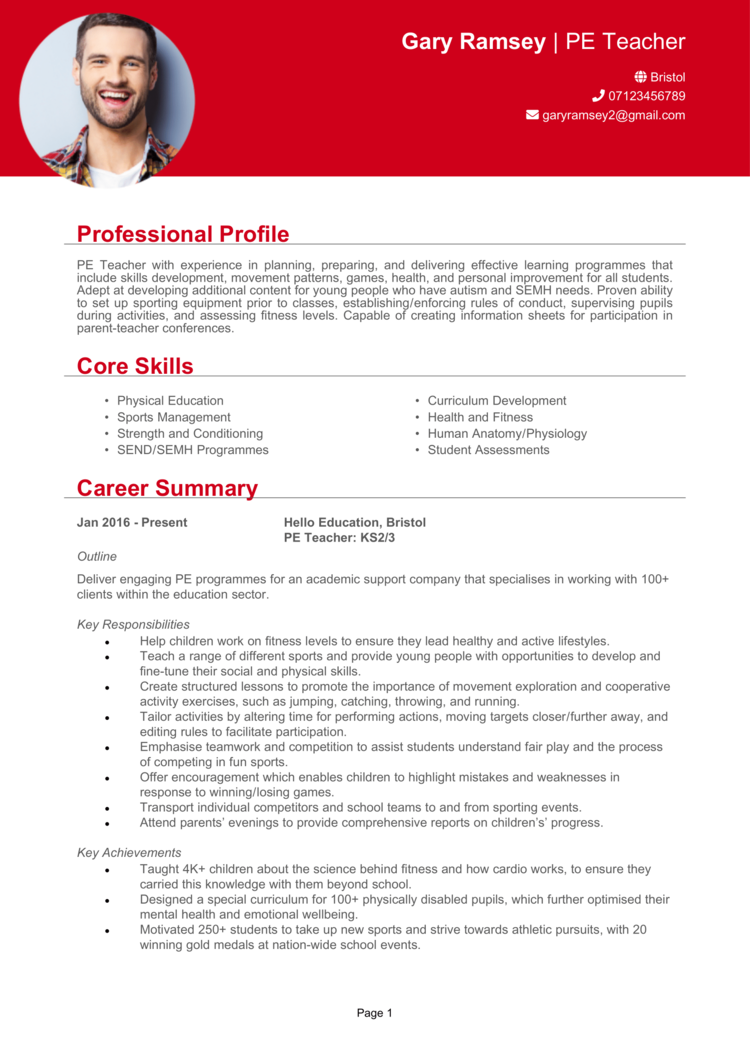
Before you start writing your CV, take a look at the example PE Teacher CV above to give yourself a good idea of the style and format that works best in today’s job market.
Also, take note of the type of content that is included to impress recruiters, and how the most relevant information is made prominent, to ensure it gets noticed.
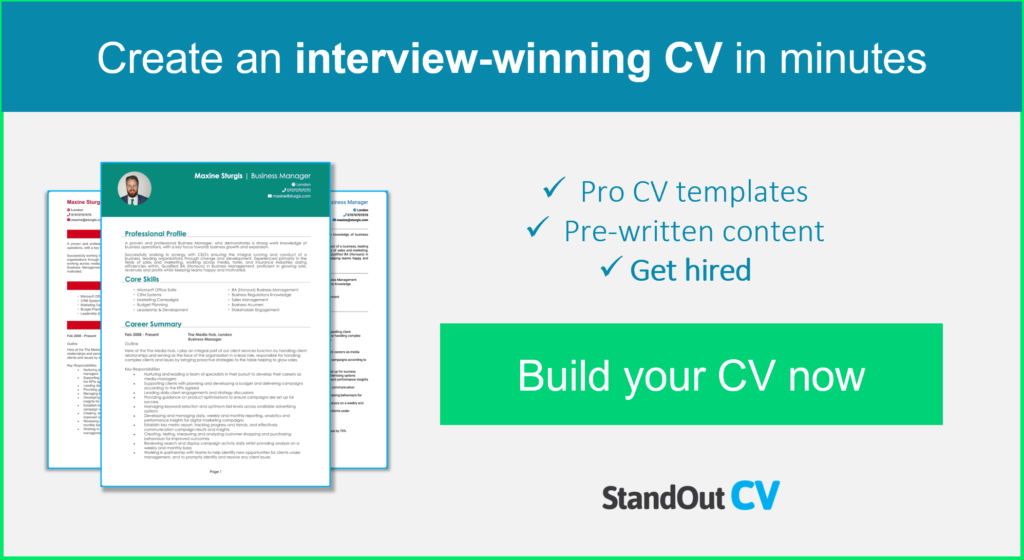
PE Teacher CV structure & formatting
Recruiters and employers are busy, and if they can’t find the information they’re looking for in a few seconds, it could be game over for your application.
You need to format and structure your CV in a way which allows the reader to pick out your key information with ease, even if they’re strapped for time.
It should be clear, easily legible, well-organised and scannable – check out some simple tips and tricks below:

How to format your CV
- Length: Think that submitting a five page CV will impress recruiters? You’re wrong! Even if you’ve got tons of experience to brag about, recruiters don’t have time to read through overly detailed CVs. Keep it short, concise and relevant – a CV length of 2 sides of A4 pages or less is perfect.
- Readability : To help busy recruiters scan through your CV, make sure your section headings stand out – bold or coloured text works well. Additionally, try to use bullet points wherever you can, as they’re far easier to skim through than huge paragraphs. Lastly, don’t be afraid of white space on your CV – a little breathing space is great for readability.
- CV design: Don’t waste time adding fancy designs to your CV. It generally adds no value to your application and may even end up distracting recruiters away from the important written content.
- Photographs: Don’t add profile photos to your CV unless you work in an industry or region which prefers to see them. Most employers in the UK will not need to see one.
Quick tip: Creating a professional CV style can be difficult and time-consuming when using Microsoft Word or Google Docs. To create a winning CV quickly, try our quick-and-easy CV Builder and use one of their eye-catching professional CV templates.

CV structure
When writing your CV , break up the content into the following key sections, to ensure it can be easily digested by busy recruiters and hiring managers:
- Contact details – Always list these at the very top of your CV – you don’t want them to be missed!
- Profile – An introductory paragraph, intended to grab recruiters attention and summarise your offering.
- Work experience / career history – Working from your current role and working backwards, list your relevant work experience.
- Education – Create a snappy summary of your education and qualifications.
- Interest and hobbies – An optional section to document any hobbies that demonstrate transferable skills.
Now, let’s take a closer look at what you should include in each section of your CV.
CV Contact Details

Make it easy for recruiters to get in touch, by heading your CV with your contact details.
There’s no need for excessive details – just list the basics:
- Mobile number
- Email address – Use a professional address with no nicknames.
- Location – Just write your general location, such as ‘London’ or ‘Cardiff’ – there’s no need to put your full address.
- LinkedIn profile or portfolio URL
PE Teacher CV Profile
Your CV profile is basically a short introductory paragraph, which summarises your key selling points and highlights why you’d make a good hire.
So, write a well-rounded summary of what you do, what your key skills are, and what relevant experience you have.
It needs to be short, snappy and punchy and, ultimately, entice the reader to read the rest of your CV.

CV profile writing tips:
- Make it short and sharp: Recruiters have piles of CVs to read through and limited time to dedicate to each, so it pays to showcase your abilities in as few words as possible. 3-4 lines is ideal.
- Tailor it: No matter how much time you put into your CV profile, it won’t impress if it’s irrelevant to the role you’re applying for. Before you start writing, make a list of the skills, knowledge and experience your target employer is looking for. Then, make sure to mention them in your CV profile and throughout the rest of your application.
- Don’t add an objective: Avoid discussing your career goals in your CV profile – if you think they’re necessary, briefly mention them in your cover letter instead.
- Avoid generic phrases: Focus on fact, not fluff. Phrases like “Committed and enthusiastic thought-leader” and “Dynamic problem solver” might sound fancy, but they’ll do nothing for your application. Not only do they sound cheesy, but they have no substance – stick to real skills and facts
Example CV profile for PE Teacher
What to include in your pe teacher cv profile.
- Summary of experience: Recruiters will want to know what type of companies you’ve worked for, industries you have knowledge of, and the type of work you’ve carried out in the past, so give them a summary of this in your profile.
- Relevant skills: Make your most relevant PE Teacher key skills clear in your profile. These should be tailored to the specific role you’re applying for – so make sure to check the job description first, and aim to match their requirements as closely as you can.
- Vital qualifications: Be sure to outline your relevant PE Teacher qualifications, so that anyone reading the CV can instantly see you are qualified for the jobs you are applying to.
Quick tip: If you are finding it difficult to write an attention-grabbing CV profile, choose from hundreds of pre-written profiles across all industries, and add one to your CV with one click in our quick-and-easy CV Builder . All profiles are written by recruitment experts and easily tailored to suit your unique skillset.
Core skills section
Underneath your profile, write a core skills section to make your most relevant skills jump off the page at readers.
It should be made up of 2-3 columns of bullet points of your relevant skills.
Before you do this, look over the job description and make a list of any specific skills, specialisms or knowledge required.
Then, make sure to use your findings in your list. This will paint you as the perfect match for the role.

Vital skills for your PE Teacher CV
Physical Education – Developing students’ physical competence and knowledge of movement and safety, and their ability to perform in a wide range of activities associated with the development of an active and healthy lifestyle.
Curriculum Development – Creating a course which meets and improves the current curriculum standards.
Teaching strategies – Using a variety of techniques and methods to support student learning.
Lesson Planning – Creating a roadmap of what student’s need to learn and how it will be done effectively during their class time.
Student Assessments – Assessing each students academic achievements throughout the school year.
Quick tip: Our quick-and-easy CV Builder has thousands of in-demand skills for all industries and professions, that can be added to your CV in seconds – This will save you time and ensure you get noticed by recruiters.
Your work experience section
Next up is your work experience section, which is normally the longest part of your CV.
Start with your current (or most recent) job and work your way backwards through your experience.
Can’t fit all your roles? Allow more space for your recent career history and shorten down descriptions for your older roles.

Structuring each role
Recruiters will be keen to gain a better idea of where you’ve worked and how you apply your skill-set in the workplace.
However, if they’re faced with huge, hard-to-read paragraphs, they may just gloss over it and move onto the next application.
To avoid this, use the simple 3-step role structure, as shown below:

Start with a 1-2 sentence summary of your role as a whole, detailing what the goal of your position was, who you reported to or managed, and the type of organisation you worked for.
Key responsibilities
Follow with a snappy list of bullet points, detailing your daily duties and responsibilities.
Tailor it to the role you’re applying for by mentioning how you put the target employer’s desired hard skills and knowledge to use in this role.
Key achievements
To finish off each role and prove the impact you made, list 1-3 stand out achievements , results or accomplishments.
This could be anything which had a positive outcome for the company you worked for, or perhaps a client/customer. Where applicable, quantify your examples with facts and figures.
Sample job description for PE Teacher CV
Deliver engaging PE programmes for an academic support company that specialises in working with 100+ clients within the education sector.
Key Responsibilities
- Help children work on fitness levels to ensure they lead healthy and active lifestyles.
- Teach a range of different sports and provide young people with opportunities to develop and fine-tune their social and physical skills.
- Create structured lessons to promote the importance of movement exploration and cooperative activity exercises, such as jumping, catching, throwing, and running.
- Tailor activities by altering time for performing actions, moving targets closer/further away, and editing rules to facilitate participation.
Quick tip: Create impressive job descriptions easily in our quick-and-easy CV Builder by adding pre-written job phrases for every industry and career stage.
Education and qualifications section
At the bottom of your CV is your full education section. You can list your formal academic qualifications, such as:
- GCSE’s
As well as any specific PE Teacher qualifications that are essential to the jobs you are applying for. Note down the name of the qualification, the organisation at which you studied, and the date of completion.
Hobbies and interests
This section is entirely optional, so you’ll have to use your own judgement to figure out if it’s worth including.
If your hobbies and interests could make you appear more suitable for your dream job, then they are definitely worth adding.
Interests which are related to the industry, or hobbies like sports teams or volunteering, which display valuable transferable skills might be worth including.
Writing your PE Teacher CV
Once you’ve written your PE Teacher CV, you should proofread it several times to ensure that there are no typos or grammatical errors.
With a tailored punchy profile that showcases your relevant experience and skills, paired with well-structured role descriptions, you’ll be able to impress employers and land interviews.
Good luck with your next job application!

IMAGES
COMMENTS
Physical Education Personal Statement. An active lifestyle has fuelled my passion for Physical Education (PE). Physical activity has played a large part in my life from dancing to competitive swimming I have always enjoyed taking part in sport and the feeling of well-being it brings. Since starting high school it's been my ambition to become a ...
Education Personal Statement Example. I was born in 1994 and was raised in Ghana, which is my country of origin. I also graduated from high school there, I really wanted to prove to my family that their efforts were not in vain. My family values a decent education; they are always supportive and they encouraged me to strive to fulfil my ...
Example 1: Entry-level teacher. I recently graduated from Little Valley University with a bachelor's degree in early childhood education. I'm seeking the role of preschool teacher at your school. For the last three years, I've worked as a substitute teacher at Willow Park Elementary.
Sport Science or PE Personal Statement Example. Sports and physical activities generally are a major part of my life, and experience of various types of sport-based work has helped me to realise that this is the field where I should like to make my career. ... PE teacher. A degree course would equip me with valuable information about the ...
Generally, physical education teachers earn an average salary of £24,000 to £32,000 per year. Those with more experience or higher qualifications can earn up to £50,000 per year. In terms of trends in the job market, there is a growing demand for physical education teachers in the UK, with the number of job openings increasing by 6% in 2020.
The personal statement presents the perfect opportunity to show you are an exceptional candidate, understand teaching and know the school you are applying to. It is not an easy task and is a tricky thing to get right. It requires being concise and clear - it shouldn't be too long or read like a list. You should talk about yourself and your ...
If you still find yourself struggling with your Physical Education personal statement, then we recommend inducing the following three points in your statement:c Talk about your love and passion for Physical Education. Any relevant work experience in the world of Physical Education. Any achievements, academic or otherwise.
use examples based on your recent teaching experience. tailor your personal statement according to the school/age group. use good, clear, written English, using first person terms such as 'my' and 'I'. be original and honest. avoid clichés and general statements, such as 'I've always wanted to teach'. demonstrate a passion for teaching.
The ingredients of a convincing teacher training personal statement are: Passion for teaching. Express your drive and fire on the page. Be individual. Stand out in a positive light; one tip here is not to waste characters on quotes, they don't say anything about you. Convey your desire to work with children.
Search for roles. Your personal statement is your first opportunity to show the school you're a great fit for the job, and gets you closer to being shortlisted for an interview. The more you show how your skills and interests match the school's ethos and values, the better. We've spoken to a range of teachers to get their top tips for ...
A personal statement is a short piece of writing (47 lines/4000 characters) which you are asked to submit in support of your application to study a PGDE/CE made through UCAS. It is your opportunity to demonstrate your skills, experience and motivation for teaching. Before you start. Remember that this is a very important part of your application.
If you're applying directly to the university, check what the word limit for your personal statement is. If you're submitting to UCAS Teacher Training, your personal statement can be up to 47 lines of text or 4,000 characters. What to write. Expanding on your mind map or list from before, think in more depth about why you want to teach.
Most people have an idea of what a "good" phys-ed teacher and also what a "bad" phys-ed teacher should be like. Personally, a good physical education teacher should be athletic, a good leader or role model, a strong communicator, confident in their abilities, motivational, organized, creative, and enthusiastic.
How to write it. You can use up to 47 lines of text (4,000 characters) in your personal statement. Some word processing packages calculate line counts differently from the UCAS Teacher Training system, so you might need to redraft your statement if there's a discrepancy between the counts. Write in English (or Welsh if you're applying to ...
Your personal statement should be: no more than 1000 words. written in the first-person. grammatically correct - we suggest writing in a document before adding to your application. your own work, don't copy from anywhere online. structured correctly with a clear introduction, evidenced paragraphs and a conclusion.
A personal statement is a critical aspect of your application and is the deciding factor in whether to invite you for an interview. If your personal statement is poorly written, it can lead to you not acquiring a place on your teacher training. Most PGCE personal statement examples include information about the writer.
Physical Education personal statement Whether watching or participating. Sport can be fun. exciting and at times rewarding. This is a personal view. but it is likely to be a view which is shared by other people of all ages. My enthusiasm for Sport first came to light when I …. PE Sport Science or PE Personal Statement Example Sports and ...
Mature students - getting ready to start your course. Mature students: five things to include in your personal statement. Preparing for study as a mature student - choosing where to study. Preparing for study as a mature student - student support. Preparing for study as a mature student - your qualifications.
Teacher Training Personal Statement Example 2. I am applying for these courses because I believe it will help me succeed in my dream to become a teacher. I have always craved teaching and learning, one of my first memories is of me, around the ages of 4 teaching my toys how to count and taking a register, ever since then I have known I wanted ...
The purpose of teaching in my eyes is to have a positive impact on your students and to reach out to as many as possible. One way I will have a positive impact on my students will be to show them that they matter and that I care about them. I will put my students above everything else and try to make a difference in their lives.
Personal statement for PGCE secondary. If you want to teach children aged 11 and over you'll need to apply through the Department for Education's (DfE) Apply for teacher training service. This example should be used for guidance only. Copying any of this text could significantly harm your chances of securing a place on a course.
Compose your statement in Word and cut and paste it into your online application. This will allow you to ensure it fits, that you have used spell check and have proofread it to ensure its word perfect. Personal statements with a poor level of written English will be rejected. Use Verdana 12 as this is the size and font used by UCAS.
PE Teacher with experience in planning, preparing, and delivering effective learning programmes that include skills development, movement patterns, games, health, and personal improvement for all students. Adept at developing additional content for young people who have autism and SEMH needs.